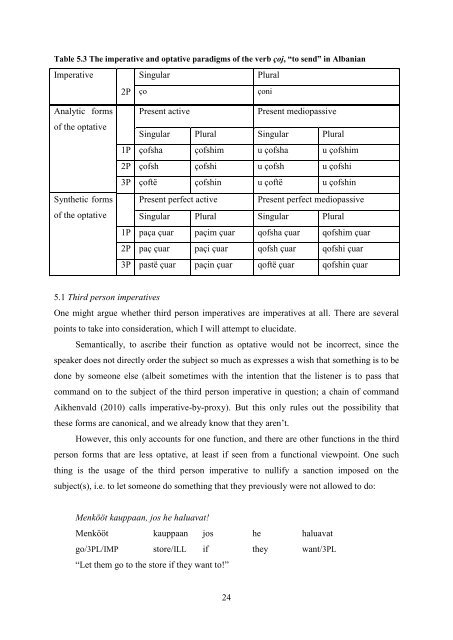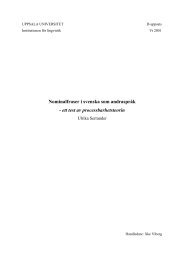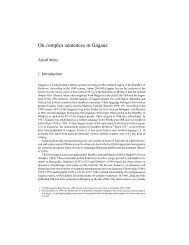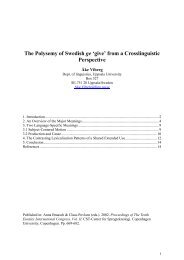The function of non-canonical imperatives in the languages of Europe
The function of non-canonical imperatives in the languages of Europe
The function of non-canonical imperatives in the languages of Europe
You also want an ePaper? Increase the reach of your titles
YUMPU automatically turns print PDFs into web optimized ePapers that Google loves.
Table 5.3 <strong>The</strong> imperative and optative paradigms <strong>of</strong> <strong>the</strong> verb çoj, “to send” <strong>in</strong> Albanian<br />
Imperative S<strong>in</strong>gular Plural<br />
2P ço<br />
çoni<br />
Analytic forms<br />
<strong>of</strong> <strong>the</strong> optative<br />
Syn<strong>the</strong>tic forms<br />
<strong>of</strong> <strong>the</strong> optative<br />
Present active<br />
Present mediopassive<br />
S<strong>in</strong>gular Plural S<strong>in</strong>gular Plural<br />
1P ç<strong>of</strong>sha ç<strong>of</strong>shim u ç<strong>of</strong>sha u ç<strong>of</strong>shim<br />
2P ç<strong>of</strong>sh ç<strong>of</strong>shi u ç<strong>of</strong>sh u ç<strong>of</strong>shi<br />
3P ç<strong>of</strong>të ç<strong>of</strong>sh<strong>in</strong> u ç<strong>of</strong>të u ç<strong>of</strong>sh<strong>in</strong><br />
Present perfect active Present perfect mediopassive<br />
S<strong>in</strong>gular Plural S<strong>in</strong>gular Plural<br />
1P paça çuar paçim çuar q<strong>of</strong>sha çuar q<strong>of</strong>shim çuar<br />
2P paç çuar paçi çuar q<strong>of</strong>sh çuar q<strong>of</strong>shi çuar<br />
3P pastë çuar paç<strong>in</strong> çuar q<strong>of</strong>të çuar q<strong>of</strong>sh<strong>in</strong> çuar<br />
5.1 Third person <strong>imperatives</strong><br />
One might argue whe<strong>the</strong>r third person <strong>imperatives</strong> are <strong>imperatives</strong> at all. <strong>The</strong>re are several<br />
po<strong>in</strong>ts to take <strong>in</strong>to consideration, which I will attempt to elucidate.<br />
Semantically, to ascribe <strong>the</strong>ir <strong>function</strong> as optative would not be <strong>in</strong>correct, s<strong>in</strong>ce <strong>the</strong><br />
speaker does not directly order <strong>the</strong> subject so much as expresses a wish that someth<strong>in</strong>g is to be<br />
done by someone else (albeit sometimes with <strong>the</strong> <strong>in</strong>tention that <strong>the</strong> listener is to pass that<br />
command on to <strong>the</strong> subject <strong>of</strong> <strong>the</strong> third person imperative <strong>in</strong> question; a cha<strong>in</strong> <strong>of</strong> command<br />
Aikhenvald (2010) calls imperative-by-proxy). But this only rules out <strong>the</strong> possibility that<br />
<strong>the</strong>se forms are ca<strong>non</strong>ical, and we already know that <strong>the</strong>y aren’t.<br />
However, this only accounts for one <strong>function</strong>, and <strong>the</strong>re are o<strong>the</strong>r <strong>function</strong>s <strong>in</strong> <strong>the</strong> third<br />
person forms that are less optative, at least if seen from a <strong>function</strong>al viewpo<strong>in</strong>t. One such<br />
th<strong>in</strong>g is <strong>the</strong> usage <strong>of</strong> <strong>the</strong> third person imperative to nullify a sanction imposed on <strong>the</strong><br />
subject(s), i.e. to let someone do someth<strong>in</strong>g that <strong>the</strong>y previously were not allowed to do:<br />
Menkööt kauppaan, jos he haluavat!<br />
Menkööt kauppaan jos he haluavat<br />
go/3PL/IMP store/ILL if <strong>the</strong>y want/3PL<br />
“Let <strong>the</strong>m go to <strong>the</strong> store if <strong>the</strong>y want to!”<br />
24
















